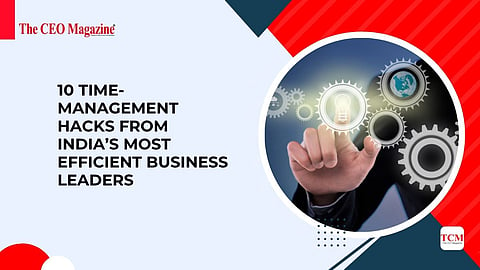
- News
- Women
- Magazine
- IndustryIndustry
- InsightsInsights
- Success Stories
- PublishPublish
- ContactContact
- Media KitMedia Kit

Time-Management Hacks
Time.
It’s the one resource every CEO, founder, and entrepreneur gets in equal measure — but some just seem to do more with it.
Have you ever looked at business leaders like Natarajan Chandrasekaran, Kiran Mazumdar-Shaw, or Nithin Kamath and thought — how do they manage it all?
Well, you’re not alone.
In my experience speaking with India’s most efficient business minds, I’ve discovered one undeniable truth:
Time management is not about doing more. It’s about doing what matters — consistently.
Let me show you how the best do it — and how you can, too.
When you run a business — especially in high-growth environments — you face constant chaos, decisions, and distractions.
And yet, some leaders rise above the noise.
They build billion-dollar empires, mentor teams, invest in startups, and stay fit — all without burning out.
The secret? Intentional time mastery.
In this article, I’m sharing 10 real-world, battle-tested time-management hacks used by India’s most productive leaders.
Zerodha co-founder Nithin Kamath swears by an early-morning routine that prioritizes reflection over reaction.
Before diving into meetings or emails, he spends an hour thinking — often while walking or meditating.
Helps you align your priorities with long-term goals.
Reduces reactive decision-making.
Boosts creative thinking and clarity.
Try this:
Block your first hour for journaling, planning, or walking. No calls. No notifications.
Many Indian tech leaders — including those from Flipkart and Freshworks — use calendar time-boxing to run their day.
It’s the practice of assigning specific time slots for deep work, meetings, email, and even breaks — just like appointments.
Eliminates decision fatigue.
Protects deep work time.
Makes your productivity visible to others.
“Show me your calendar, and I’ll show you your priorities.”
– Anonymous
Kunal Bahl, Snapdeal’s co-founder, is a big believer in Pareto’s Principle — the idea that 80% of outcomes come from 20% of efforts.
Identifies key high-impact decisions.
Delegates or eliminates the rest.
Spends time only on things that move the business needle.
Ask yourself daily:
What’s the one thing I can do today that makes everything else easier or unnecessary?
Did you know that it takes an average of 23 minutes to refocus after being interrupted? (Source: University of California, Irvine)
That’s why leaders like Falguni Nayar (Nykaa) use task batching — grouping similar tasks together to improve focus.
Mornings: Deep work like strategy or product reviews.
Afternoons: Calls or internal updates.
Evenings: Emails, LinkedIn, low-energy admin work.
Bonus Tip: Try using a tool like Notion or Sunsama to organize task categories.
One thing I’ve noticed across leaders like Kiran Mazumdar-Shaw and Ritesh Agarwal (OYO) is how often they say “No” — not because they don’t care, but because they care too much about what matters.
Low-impact meetings.
Unstructured catch-ups.
Opportunities not aligned with your mission.
“Saying no is not a rejection. It’s respect for your priorities.”
– Warren Buffett
India’s most efficient leaders don’t try to do everything themselves.
They invest in people, processes, and performance metrics — and then get out of the way.
Be clear about outcomes, not just tasks.
Create SOPs for repetitive activities.
Use tools like Trello, Asana, or ClickUp for team visibility.
In my experience, delegation isn’t just a skill — it’s an act of leadership.
Serial entrepreneur and AngelList co-founder Naval Ravikant is known for simplifying life.
One of his best hacks?
If a task takes less than 2 minutes — do it now.
It kills procrastination and prevents inbox and task bloat.
Use this during:
Morning email checks.
Slack responses.
Quick internal approvals.
Try it for a week — you’ll be amazed at how much lighter your day feels.
What gets measured, gets managed.
Top Indian leaders perform weekly reviews — just like boardroom updates.
What went well?
What didn’t?
What are next week’s top 3 priorities?
Productivity guru Radhakrishnan Pillai (author of Corporate Chanakya) teaches leaders to simplify their day with the Rule of 3.
If you accomplish just 3 meaningful tasks daily, you’ll outperform 90% of people stuck in busywork.
Finalize quarterly roadmap.
Investor follow-up call.
Team huddle on hiring strategy.
Stick to this and you’ll build momentum — without burnout.
Time is important. But energy is everything.
Leaders like Bhavish Aggarwal (Ola) and Narayana Murthy schedule around their energy peaks — not just availability.
Morning peak? Schedule strategy and decisions then.
Afternoons low? Do admin or take walking breaks.
Sleep, fitness, and nutrition are non-negotiables for India’s top leaders — because their energy drives their impact.
“Burnout is not a badge of honour. It’s a business liability.”
– Arianna Huffington
You can always raise more capital, hire more people, build more features —
but you can’t create more time.
So the question is:
Are you spending your time — or investing it?
If you adopt even 3 of these 10 time-management hacks, you’ll:
Make better decisions.
Work less, but achieve more.
Feel more control and less chaos.
Follow us on Google News
